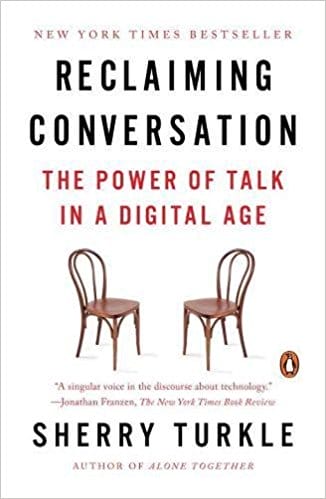According to some recent Pew Research, approximately two-thirds of all American adults own a smartphone. With those phones, they can access the internet, send text messages and check email, among other things. Another Pew study states that U.S. smartphone owners between the ages of 18 and 24 send and receive almost 4,000 texts per month. Sherry Turkle, author of Reclaiming Conversation – The Power of Talk in a Digital Age writes that smartphones are similar to a “benevolent genie” in that they attempt to grant us three wishes: 1) We will always be heard, 2) We will never be bored and 3) We’ll never be alone. Unfortunately, these promises have changed our behaviors and moved us away from something uniquely human: conversation.
Turkle’s research started with examining the sentiment of “I’d rather text than talk.” What she found was that this new type of communication (similar to email, Twitter, Snapchat, etc.) has some dire consequences for us as individuals, for our families, for romantic couples, for friendship, for education and for the way we work.
PERSONAL
First, some scary research results:
- The average American adults checks his/her phone every 6.5 minutes.
- The average user first reaches for their phone at 7:31 am.
- Many users pick up their phone more than 1,500 times per week.
In our attempt to always be connected to others, we have lost our ability to connect with ourselves in solitude. And, solitude gives us the space to discover ourselves, what’s important to us and to contemplate our lives. In our attempt to always be entertained we are missing out on the privilege of being bored. And, being bored is simply an opportunity to go inward – to exercise your imagination or think in a new way. Some research tells us that the ‘always-on’ aspects of smartphones and social media may lead to greater feelings of depression and anxiety. In addition, those who use social media are having difficulty reading emotions…even their own!
FAMILY
Once, family dinners were time for connection. Now, parents are posting pictures of the family at dinner on Facebook. In one study of families at a restaurant with kids, almost every adult paid more attention to their phones than to their kids. (I witnessed a father with three kids at a restaurant just two weeks ago and he paid almost no attention to his kids and each of the kids were on their own electronic devices, as well.)
Many times, we think that apps such as Find My Friends allows parents to make sure their kids are safe when we are actually reducing the need for conversation. Instead of talking to our kids about making good judgments about their own safety, we opt for an app. These awkward, sometimes painful, conversations teach our kids how to have difficult conversations. So, instead of conversation, we opt for surveillance and some dots on a screen that tell us where our daughter is at every moment.
FRIENDSHIP
One story that Turkle relates comes from a college student in the midst of an adversity. The student remains connected to her friends as they text her support. The friend that has raced to her side, however, is ignored. The friends who are texting feel they are helping someone they care about by electronically checking in. The friend who has dropped what she was doing feels left out. The paradox is that we’re hypervigilant when we’re apart and somewhere else when we’re together.
The other theme is that texting is just easier than having a conversation. Conversation requires curiosity, thinking on your feet and not being perfect. Texting, emailing and posting allow us to put our best selves on display. Social media sites say they give us a sense of community. Spending time with friends, giving them your undivided attention and engaging in conversation is community.
ROMANCE
Imagine that someone approaches you and asks you on a date. If you are not interested or in a relationship, you have to tell this person it’s not going to happen. In the world of online dating, you just don’t respond when you are not interested. Turkle says that it’s “friction free” – we simply swipe someone’s picture and they go away.
As with the family, important conversations are taking place over text or email. Instead of engaging and connecting, we opt for writing a message. It allows us to respond when it’s convenient for us. It allows us to edit messages with the help of our friends to make sure we get the message “right.”
EDUCATION
The classroom of the future is here. Schools that can afford them are giving iPads to students and keeping them engaged by assigning homework that can be done online and is entertaining in short bursts. All of this focus on integrating technology into the classroom is preventing kids from exercising deep attention. If something is not holding their attention, kids claim they are bored.
Studies show that just one student using electronics in the classroom degrades the performance of those around him. Research also shows that MOOCs (Massively Open Online Courses) are more effective when there is an in-person component. Face-to-face encounters force students to practice civility and to be accountable for what they add to the class. Proponents of online courses talk about higher participation rates when comments are anonymous. Turkle counters with the idea that real growth occurs when we “walk towards embarrassment.”
WORK
According to the research of MIT visiting scientist Ben Waber, workers are more productive when they…wait for it… talk! Unfortunately, we are so over-scheduled that we rarely have time to just talk. One CEO was so tired of the lack of conversation at his company that he now buys breakfast for the entire company, once a week. The goal is to make time for conversation. Meetings are down 20%, productivity is up and people are having more conversations. Other companies are starting to ban electronics from meetings. In short, we build trust and learn when we talk more and email less.
THE WAY FORWARD
Turkel doesn’t like referring to our technology as addictive because it infers we are powerless. With tongue in cheek, she writes that if you find yourself addicted to heroine, get off of it. Our smartphones have become so integrated that getting rid of them is not really an option for most of us. It all boils down to being intentional. Every time you reach for your phone (especially in front of your kids, your employees or your client), pause and consider your options. Limit your use of social media. Recognize that over use can be bad for you and that every post, every search and every transaction (even those that are incognito) is being tracked. Stop thinking that you need your phone in case of an emergency. “If you see life as a stream of emergencies,” writes Turkle, “this frames your life narrative.” And, remember, you are probably not as important as you think you are.



